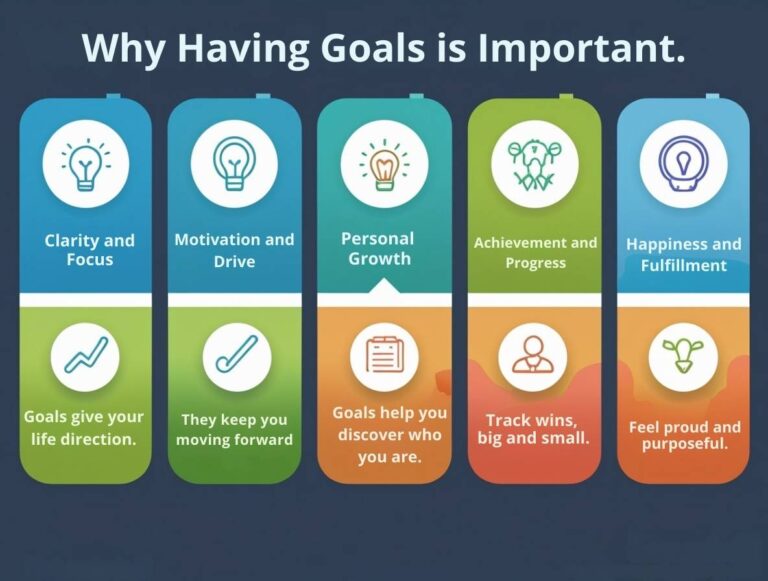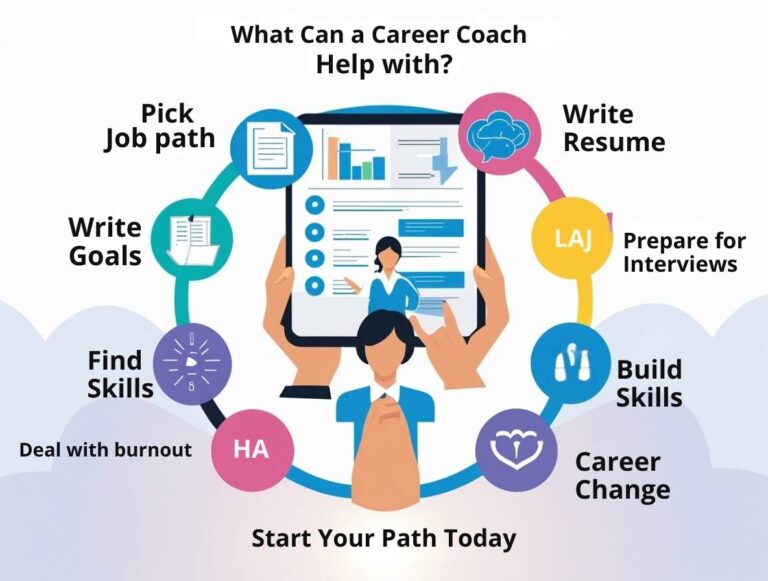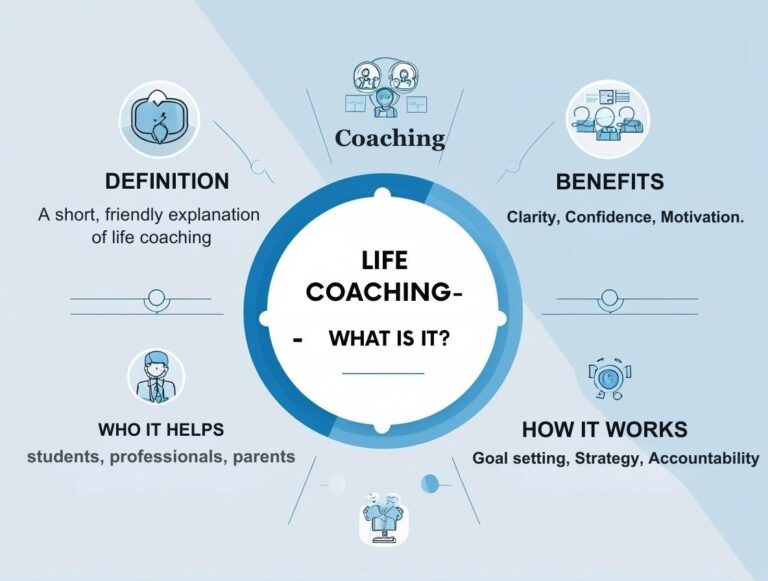Hi, I’m a certified life coach, but more than that—I’m someone who’s been through the stuck, the stress, and the “now what?” moments. I know what it feels like to chase clarity, confidence, and purpose. That’s why I do what I do.
I help people like you get clear on what they want, break through old patterns, and build a life that actually feels good. No fluff. No judgment. Just honest support, simple tools, and a space to grow.
My approach blends practical coaching techniques with real-life insight. I use proven methods rooted in psychology, but I keep it simple and human. Whether you’re feeling lost, ready for a change, or just need someone in your corner—I’m here for it.
This isn’t about fixing you. It’s about finding you. Let’s take the next step—together.
Life coaching—what is it, really?
It’s a simple way to get support when you feel stuck. A life coach doesn’t tell you what to do. They help you find your own path, step by step. Think of it like a gym trainer—but for your goals and mindset.
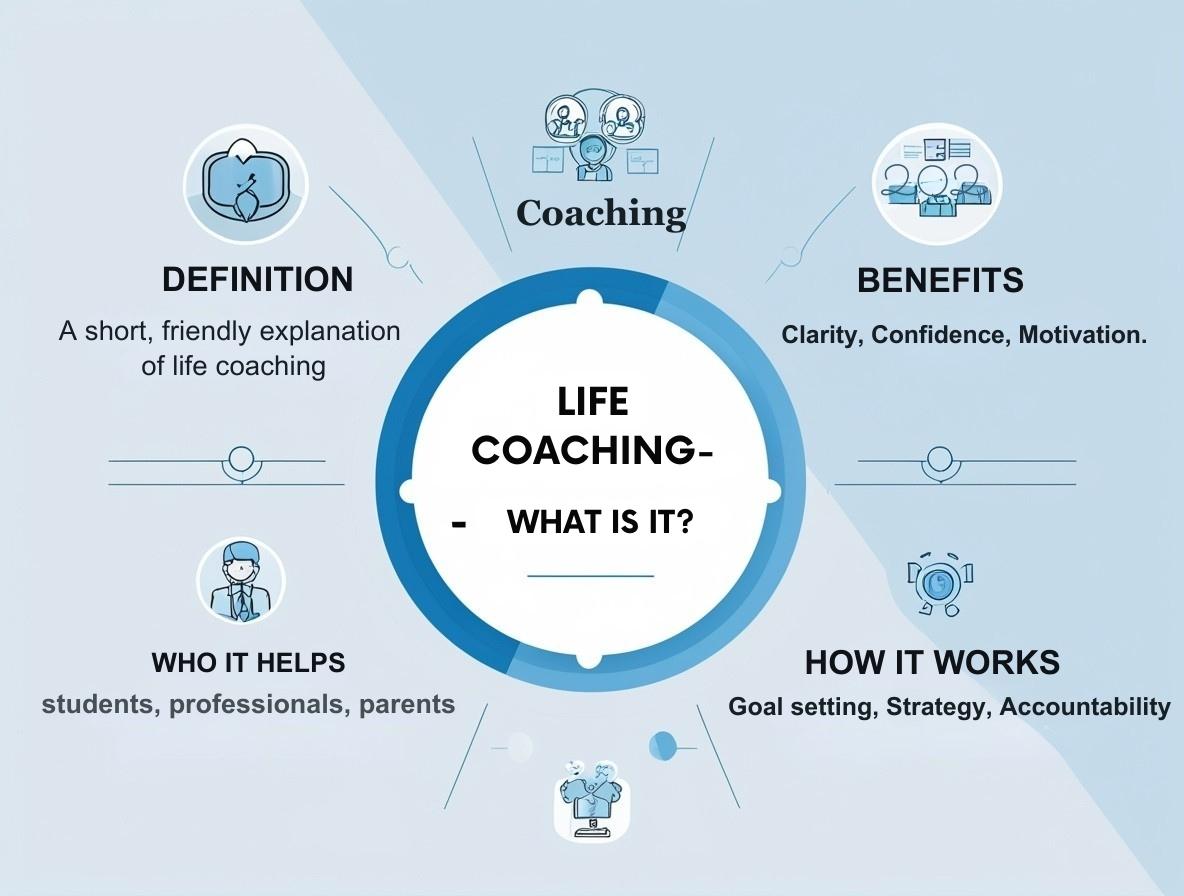
Coaching is not therapy. Therapy looks back. Coaching looks ahead. It’s not mentoring either. Mentors give advice. Coaches help you decide what works best for you.
Lots of people work with a coach now. Life moves fast. It’s easy to feel lost. Coaching helps you pause, breathe, and move forward with care. I’ve seen it help others—and it’s helped me too.
So if you’re asking, “Life coaching—what is it?” It’s support that meets you where you are and helps you grow. You don’t need to fix yourself. You just need the right tools and someone in your corner.
Life Coaching in Psychology – What Does Science Say?
Life coaching isn’t therapy—but it is backed by science. Therapy looks to the past. Coaching helps you move forward. It’s not about fixing you. It’s about finding what works and building from there.
Coaching often uses tools from psychology. That includes CBT (Cognitive Behavioral Therapy), goal-setting, and positive thinking. These ideas help shift how we see things, feel things, and do things.
I once coached a woman who felt stuck at work. We used a tool from CBT. She tracked her thoughts and saw where fear was getting in the way. In a few weeks, she asked for a raise. She got it.
That’s what life coaching does. It gives you tools and support to grow. It blends care with science.
So, life coaching—what is it in psychology? It’s a way to help you change your path, your pace, and your peace of mind.
What Does a Life Coach Actually Do?
So, what does a life coach do, really? In simple words, we help you get clear on what you want and take steps to get there. It’s like having someone on your team who listens, cheers you on, and helps you find your way.
We Help You Focus on What Matters Most
Life can get loud. Work, family, pressure… all of it. A coach helps you slow down, think things through, and move forward.
- Here are some things I help with:
- Career: You want to grow, switch paths, or stop feeling stuck.
- Love and people: You want to build better ties or set clear lines.
- You: You want to feel like you again.
Answer: A coach helps you find what you care about and take small, smart steps toward it.
What Happens in a Session?
In our first chat, we talk about where you are and where you want to be. I use simple tools that make things feel less big and clearer.
Each session is calm, kind, and built for you. I ask things like, “What would feel good this week?” Then we plan what to try next.
You’ll leave each call with a small step. One that feels right, not scary.
Answer: You talk, I guide. We plan real steps that fit your life.
A Real Story
One woman I coached—we’ll call her Sara—felt stuck. Her job drained her. She gave all her time to others and had none left for herself.
In our work, she learned to set small, clear lines. One day, she told me, “I said no—and didn’t say sorry.”
That moment? Huge.
Answer: Coaching helps you grow. You start saying “yes” to what matters and “no” to what doesn’t.
What Can You Expect Over Time?
Coaching won’t fix your life in one call. But it will help you feel more sure, more free, and more like you again.
Here’s what I hear from clients:
- I trust myself more.
- I know what I want now.
- I feel less lost.
- I say what I need without guilt.
Answer: You feel more clear, calm, and in charge of your path.
Life Coach Certification – What You Need to Know
So, do you have to be certified to be a life coach?
Short answer: No. But let’s talk about the “but.”
Is Certification Required?
Nope, it’s not legally required. You could start coaching tomorrow without a single piece of paper.
Answer: You don’t need a license to be a life coach—but training helps you show up better for your clients.
That said, getting certified can make a big difference. It gives you tools, structure, and confidence. Clients might trust you more if they know you’ve put in the work. Think of it like this: anyone can bake a cake, but trained bakers know the right temps, the best ingredients, and how not to burn the thing.
What’s the Difference Between Certified and Non-Certified Coaches?
A certified coach has gone through a program. They’ve studied how to ask better questions, listen deeper, and guide without leading. They’ve practiced real sessions, often with feedback from mentors.
A non-certified coach might still be great—but they may rely more on intuition or lived experience. That’s not a bad thing—it just means they might not have formal training in coaching models or ethics.
Answer: Certified coaches learn proven tools. Non-certified coaches may coach from instinct. Both can help—but training adds depth.
What Should You Look For in a Program?
If you’re thinking of becoming a coach, don’t just pick the first program that pops up on Google. Look for:
- Accreditation (ICF-approved is a good sign)
- Real practice sessions with feedback
- Courses that teach ethics, mindset, and coaching structure
- A good fit with your style and goals
Some top names? Co-Active, iPEC, The Life Coach School, and ICA are all solid. But the best program is the one that helps you grow and feel ready to coach with care.
Answer: Pick a coaching program with real practice, good reviews, and values that feel right to you.
My Journey with Certification
When I started coaching, I was full of heart but low on structure. I knew how to help people, but I wanted more tools in my kit.
I chose to get certified because I wanted to show up with skill, not just passion. I picked a program that focused on both mindset and action. I got to practice with peers, get honest feedback, and grow my voice as a coach.
Was it easy? No. But it gave me clarity, confidence, and a foundation I still lean on today.
Answer: I chose certification to grow my skills and serve clients better—and I’m so glad I did.
Life Coach Examples – What Kinds Are There?
There’s a coach for almost everything. It all depends on what you need right now.
Types of Life Coaches (And What They Do)
Think of coaches like tools in a toolbox. Each one helps with something different.
- Executive coaches help with work, goals, and stress at the top.
- Health coaches focus on habits, food, and daily choices.
- Relationship coaches support love, family, and clear boundaries.
- Spiritual coaches guide you through life’s deeper questions.
- Mindset coaches help with confidence, thoughts, and emotions.
- Career coaches support job moves, growth, or purpose.
Answer: Life coaches have different focuses—like work, health, or mindset—so you can get the help that fits you best.
Real Coaches, Real Stories
In my work, I’ve played many of these roles.
One client—let’s call her Jade—wanted a job change. At first, it seemed simple. But under that was stress, doubt, and lost confidence. So we worked on her mindset too. Two months later? New job, new peace.
Big names like Brendon Burchard and Martha Beck coach thousands. Their work blends heart, skill, and strategy.
Answer: Some coaches blend styles. Some are famous. Some are local. What matters is how they help you grow.
How to Find the Right Coach
Finding a coach is a lot like dating. You want someone who gets you, and makes you feel safe.
Ask yourself:
- What do I want help with?
- Do I want someone soft or more direct?
- Can I be honest with them?
Talk to a few. Many offer free calls. Go with the one that feels right in your gut.
Answer: To find the right coach, know what you want, trust your gut, and try a few free chats first.
Is Life Coaching Right for You?
If you feel stuck or unsure, life coaching might help.
Let’s break it down.
Signs You Might Need Coaching
Coaching is not just for hard times. It’s for any time you want more clarity, growth, or peace.
Some signs it could help:
- You don’t know what’s next—but you know this isn’t it.
- You keep setting goals but don’t follow through.
- You feel lost in work or love.
- You want change but don’t know where to start.
- You need a kind push and someone to listen.
If you feel lost or want change, coaching can help you move forward.
A lot of my clients say, “I should be happy… but something feels off.” That’s where we start.
What to Expect from Coaching
Coaching feels like a safe talk with a clear goal. We meet, we talk, and we make a plan. I don’t give advice. I ask the right questions so you can find your own answers.
Each chat is built around you. Some days it’s deep work. Other days it’s one small shift. Both matter.
Coaching is a space to think, grow, and feel heard.
I once had a client cry in session—not from pain, but from relief. She said, “This is the first time I’ve felt seen in years.”
Red Flags When Picking a Coach
- Not all coaches are the same. Look for one that fits you. Here’s what to avoid:
- They make big promises—like fast fixes or huge results overnight.
- They talk more than they listen.
- They seem pushy or make you feel wrong.
- They won’t give you a free call first.
Watch out for coaches who rush you, push hard, or don’t listen well.
When you find the right coach, it feels easy. Like you can breathe again.
My Experience as a Life Coach
Why I Got Into Coaching
A few years ago, I felt stuck. On paper, life looked fine. But inside? I felt lost.
I didn’t know what I wanted. I was tired. I was going through the motions.
Then I found a coach.
She didn’t fix me. She just listened. She asked me simple, strong questions. And I started to hear myself again.
That was the spark. I knew I wanted to help others the way she helped me.
I became a life coach because it helped me find myself, and now I help others do the same.
Here is my certificate
from the International NLP Academy Germany and Iran
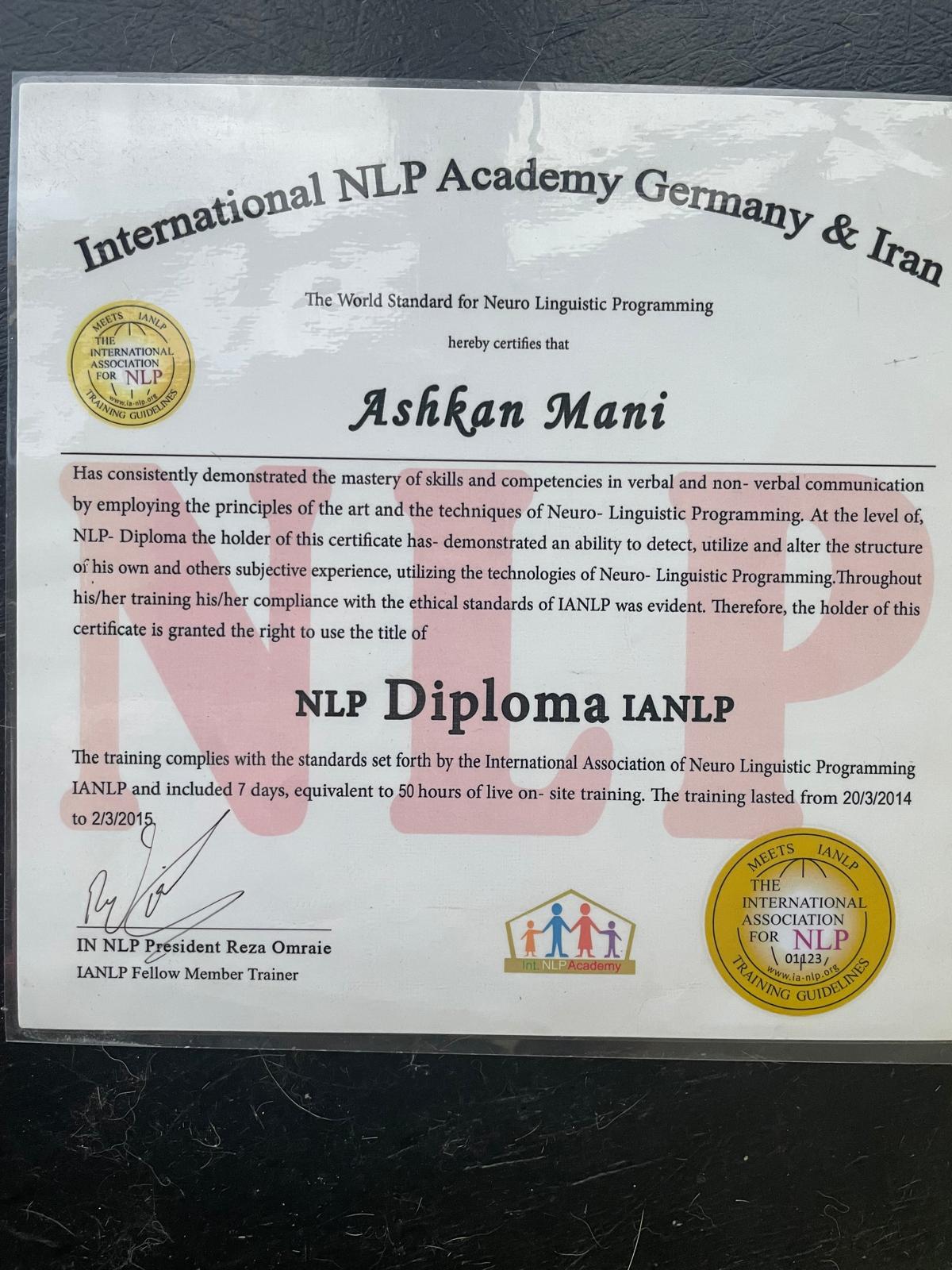
What I’ve Learned
- Coaching has taught me a lot. But a few things stand out:
- People don’t need to be fixed. They need space.
- Small steps work better than big leaps.
- The answers are already inside you.
- Each client is different. But this truth stays the same: We all want to feel clear, calm, and strong.
Coaching works best when it helps you take small, real steps—and trust yourself again.
A Client Story I’ll Never Forget
One client—let’s call her Maya—came to me tired. Her job drained her. She gave so much to others that she forgot herself.
- I asked her, “What would change if you treated yourself with care?”
- She got quiet. Then she cried. “I never have,” she said.
- That moment changed everything.
- We started small. Saying no. Resting. Painting again—just for fun.
- Weeks later, she said, “I feel like me again.”
Coaching gives you room to grow—and feel like yourself again.
This work means a lot to me. I’ve lived it. I’ve seen it work. And I know how good it feels to be heard.
If you’re ready to feel more like you again—I’m here.
FAQs About Life Coaching What is it
Life coaching – what is it in psychological terms?
A: Life coaching helps you grow. It helps set goals, build new habits, and stay on track. It’s not therapy. It’s support to help you move ahead.
Do life coaches need certification?
A: No. A life coach does not need a license. But many take a course to learn skills and build trust with clients.
How do I choose the right life coach?
A: Pick a coach you trust. You should feel safe and heard. Check their reviews. Pick one who fits your goals and vibe.
What is the difference between a therapist and a life coach?
A: A therapist treats pain from the past. A coach helps with now and the next step. One heals. One guides.
Can life coaching really help me change my life?
A: Yes! A coach can help you see things clear, set goals, and stay strong. Change is real when you have help and a plan.
Final Thoughts – Why Life Coaching Matters
Life coaching matters because it helps you feel clear, calm, and ready to move forward. When life feels heavy or confusing, a coach can help you breathe and find your way again. You don’t need to have it all figured out. You just need a safe space to talk, reflect, and grow. Coaching gives you that. It’s not about being perfect—it’s about taking small steps that feel right for you. I’ve seen it change lives in quiet, real ways. Sometimes that means setting a goal. Other times, it means learning to say no. Big or small, the shifts add up. If you’ve ever felt stuck, lost, or just off-track, coaching can help you come back to yourself. I offer free chats if you’re curious. No pressure. Just a chance to talk and see if it fits. Let’s make space for what matters one step at a time.

